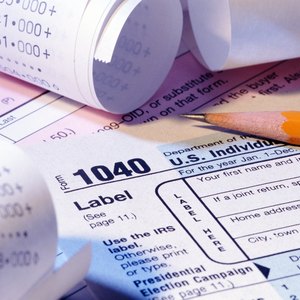
After waiting patiently for and expecting a refund from Uncle Sam at tax time, the last thing you want to find out is that your refund has been garnished. While federal income tax refunds are generally exempt from judgments and garnishments, there are a few exceptions. These exceptions typically apply to debts owed to government agencies, including state governments.
Tips
There are several agencies that can garnish your federal tax refund. They include student loan agencies, child support agencies, unemployment offices and the IRS itself.
Tax Offsets
The treasury department has a division dedicated to debt collection, called the Treasury Offset Program, or TOP, that is run by the Treasury Department's debt management service. In order for the department to garnish your tax refund, the debt management service must receive a notification from the appropriate department with proof of the debt and the amount you owe, which it will then verify. Once that has been completed, TOP can set the amount required to be deducted from your income tax refund.
Debts Garnished
Eligible debts for tax return garnishment are debts owed to the government. Therefore, debts owed to private individuals or companies are not eligible for tax return offsets. Any government agency can apply to have your tax refund offset to help collect past due amounts. Common debts that are used for offsets include federal – but not private – student loans, past due child support, unemployment insurance overpayment, as well as the fees and penalties resulting from those debts.
Spouse's Debts
If you are married and filing a joint refund, and your federal tax refund is garnished to offset a debt belonging exclusively to your spouse, you may be eligible to receive part of the refund as long as you can prove the debt in question is solely the obligation of your spouse. You will have to fill out Form 8379, which can be submitted either with your income tax form or after you have received notification of garnishment of your federal tax refund. Be advised, however, that you can only receive the portion of the federal tax refund for which you individually qualified.
Avoiding Garnishment
If you suspect you may have past due balances for government agencies, the best way to avoid garnishment of your federal tax refund is to contact those agencies prior to filing your tax return to make payment arrangements. Although you may still have your refund garnished, in most cases, you do not have to pay the entire debt before your tax return is filed; setting up a payment plan is sufficient to avoid garnishment of your federal tax refund.
References
- IRS: Tax Topic 203 Refund Offsets
- IRS: About Form 8379, Injured Spouse Allocation
- Legal Beagle: Federal Income Tax Refund Garnishment Laws
- Michigan Legal Help: Garnishment of Tax Refunds
- Bureau of the Fiscal Service. "Tax Refund Offset." Accessed May 7, 2020.
- Taxpayer Advocate Service. "Refund Offsets." Accessed May 7, 2020.
- Taxpayer Advocate Service. "Contact Us." Accessed May 7, 2020.
- Student Loan Borrower Assistance. "Tax Refund Offsets." Accessed May 7, 2020.
- IRS. "Frequently Asked Questions / Refund Inquiries." Accessed May 7, 2020.
- Congressional Research Service. "The Child Support Federal Tax Offset of CARES Act Economic Impact Payments." Page 1. Accessed May 7, 2020.
